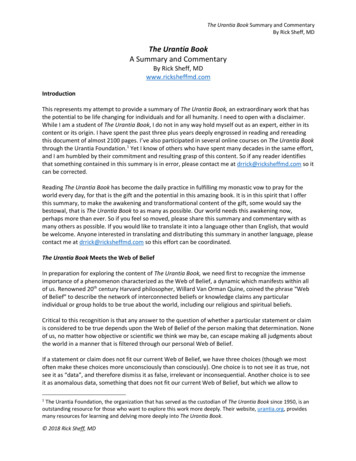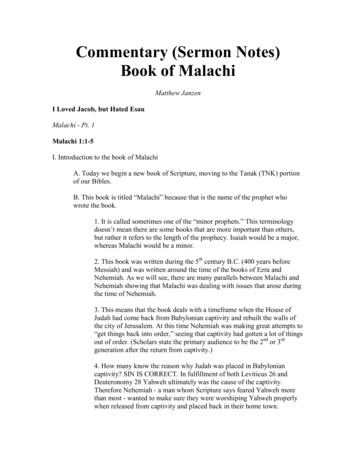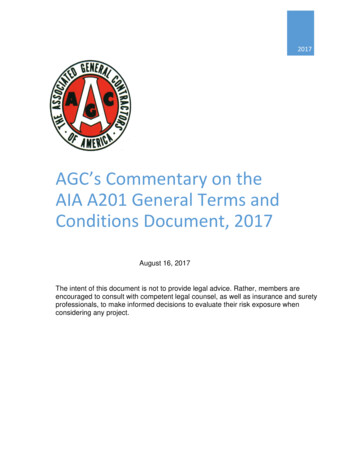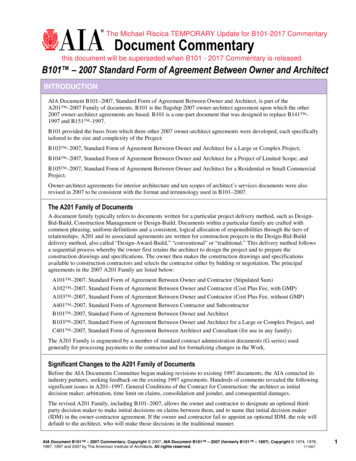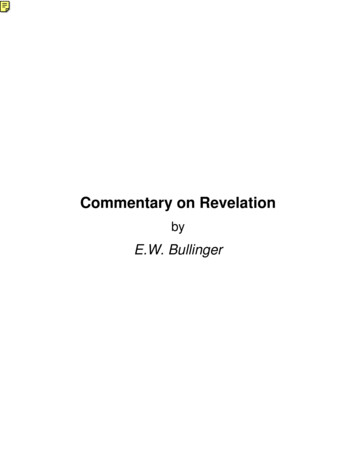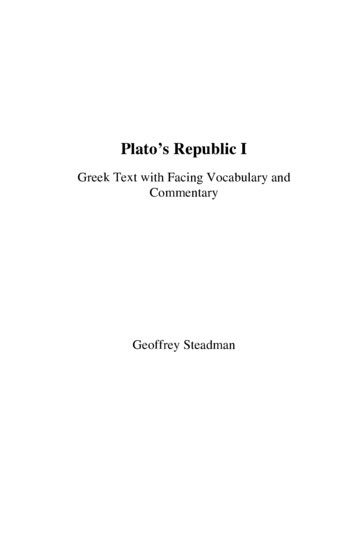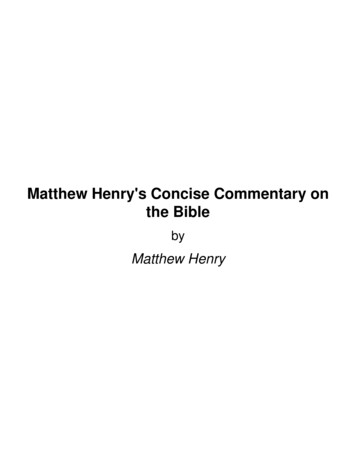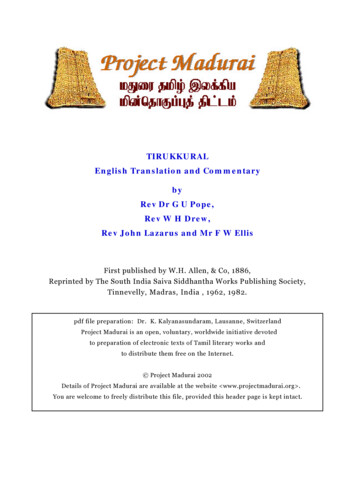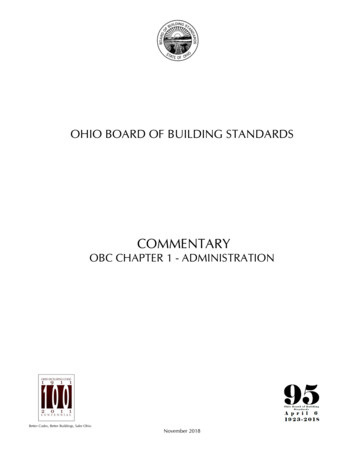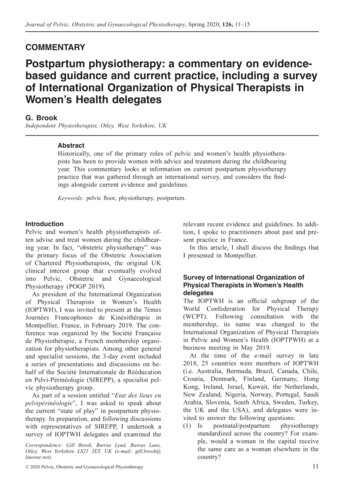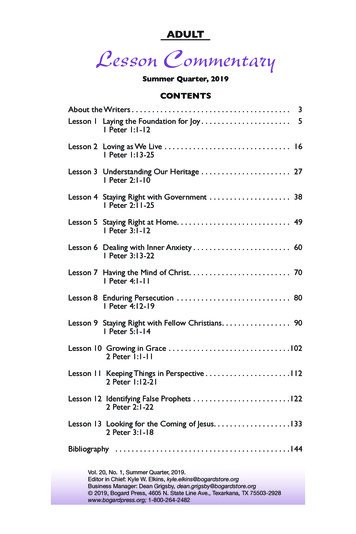
Transcription
Commentary onthe Book of ActsBible Study Notesand Commentsby David E. PratteAvailable in print atwww.gospelway.com/sales
Commentary on the Book of Acts:Bible Study Notes and Comments Copyright David E. Pratte, 2011, 2013Minor revisions 2016All rights reservedISBN-13: 978-1492840312ISBN-10: 1492840319Note carefully: No teaching in any of our materials is intended or should ever be construed to justify or to in any wayincite or encourage personal vengeance or physical violenceagainst any person.Front page photoThe Mount of Olives from which Jesus ascended back to heaven“Now when He had spoken these things, while they watched, Hewas taken up, and a cloud received Him out of their sight Thenthey returned to Jerusalem from the mount called Olivet, which isnear Jerusalem ” – Acts 1:9,12 (NKJV).Photo Credit: Nemo distributed under Creative Commons license,via Wikimedia CommonsOther AcknowledgementsUnless otherwise indicated, Scripture quotations are generally from theNew King James Version (NKJV), copyright 1982, 1988 by Thomas Nelson,Inc. used by permission. All rights reserved.Scripture quotations marked (NASB) are from Holy Bible, New American Standard La Habra, CA: The Lockman Foundation, 1995.Scripture quotations marked (ESV) are from The Holy Bible, EnglishStandard Version, copyright 2001 by Crossway Bibles, a publishing ministry of Good News Publishers. Used by permission. All rights reserved.Scripture quotations marked (MLV) are from Modern Literal Versionof The New Testament, Copyright 1999 by G. Allen Walker.Scripture quotations marked (RSV) are from the Revised Standard Version of the Bible, copyright 1952 by the Division of Christian Education, National Council of the Churches of Christ in the United States of America.Scripture quotations marked (NIV) are from the New InternationalVersion of the Holy Bible, copyright 1978 by Zondervan Bible publishers,Grand Rapids, Michigan.Commentary on ActsPage #2
Other Books by the AuthorTopical Bible StudiesGrowing a Godly Marriage & Raising Godly ChildrenWhy Believe in God, Jesus, and the Bible? (evidences)The God of the Bible (study of the Father, Son, and Holy Spirit)Grace, Faith, and Obedience: The Gospel or Calvinism?Kingdom of Christ: Future Millennium or Present Spiritual Reign?Do Not Sin Against the Child: Abortion, Unborn Life, & the BibleTrue Words of God: Bible Inspiration and PreservationCommentaries on Bible BooksGenesisJoshua and RuthJudges1 SamuelEzra, Nehemiah, and EstherJobProverbsGospel of MarkGospel of JohnActsRomansEphesiansPhilippians and ColossiansHebrews1 & 2 PeterBible Question Class BooksGenesisJoshua and RuthJudges1 SamuelEzra, Nehemiah, and EstherJobProverbsEcclesiastesIsaiahGospel of MatthewGospel of MarkGospel of LukeGospel of JohnActsRomans1 Corinthians2 Corinthians and GalatiansEphesians and PhilippiansColossians, 1&2 Thessalonians1 & 2 Timothy, Titus, PhilemonHebrewsGeneral Epistles (James – Jude)RevelationWorkbooks with Study NotesJesus Is Lord: Workbook on the Fundamentals of the Gospel of ChristFollowing Jesus: Workbook on DiscipleshipGod’s Eternal Purpose in Christ: Workbook on the Theme of the BibleVisit our website at www.gospelway.com/sales to see acurrent list of books in print.Page #3Commentary on Acts
Other Resources from the AuthorPrinted books, booklets, and tracts available atwww.gospelway.com/salesFree Bible study articles online atwww.gospelway.comFree Bible courses online atwww.biblestudylessons.comFree class books atwww.biblestudylessons.com/classbooksFree commentaries on Bible books atwww.gospelway.com/commentaryContact the author atwww.gospelway.com/commentsCommentary on ActsPage #4
Table of ContentsIntroduction to the Book of Acts . 9Acts 1. 18Acts 2 . 31Acts 3 . 62Acts 4 . 74Acts 5 . 92Acts 6 . 105Acts 7 . 118Acts 8 . 140Acts 9 . 156Acts 10 . 175Acts 11 . 192Acts 12. 205Acts 13 . 213Acts 14. 230Acts 15 . 241Acts 16. 262Acts 17 . 276Acts 18 . 291Acts 19.300Acts 20 . 311Acts 21. 333Acts 22 . 343Acts 23 . 352Acts 24 . 359Acts 25 . 369Acts 26 . 375Acts 27 . 383Acts 28 . 391(Due to printer reformatting, the above numbers may be off a few pages.)Page #5Commentary on Acts
Notes to the ReaderTo save space and for other reasons, I have chosen not to includethe Bible text in these notes (please use your Bible to follow along). WhenI do quote a Scripture, I generally quote the New King James Version,unless otherwise indicated. Often – especially when I do not use quotations marks – I am not quoting any translation but simply paraphrasingthe passage in my own words. Also, when I ask the reader to refer to amap, please consult the maps at the back of your Bible or in a Bible dictionary.You can find study questions to accompany these notes atwww.gospelway.com/salesTo join our mailing list to be informed of new books orspecial sales, contact the author atwww.gospelway.com/commentsCommentary on ActsPage #6
Introductory Thoughts aboutCommentariesOnly the Scriptures provide an infallible, authoritatively inspiredrevelation of God’s will for man (2 Timothy 3:16,17). It follows that thiscommentary, like all commentaries, was written by an uninspired, fallible human. It is the author’s effort to share his insights about God’s wordfor the purpose of instructing and edifying others in the knowledge andwisdom found in Scripture. It is simply another form of teaching, likepublic preaching, Bible class teaching, etc., except in written form (liketracts, Bible class literature, etc.). Nehemiah 8:8; Ephesians 4:15,16; Romans 15:14; 1 Thessalonians 5:11; Hebrews 3:12-14; 5:12-14; 10:23-25;Romans 10:17; Mark 16:15,16; Acts 8:4; 2 Timothy 2:2,24-26; 4:2-4; 1Peter 3:15.It follows that the student must read any commentary with discernment, realizing that any fallible teacher may err, whether he is teachingorally or in writing. So, the student must compare all spiritual teachingto the truth of God’s word (Acts 17:11). It may be wise to read severalcommentaries to consider alternative views on difficult points. But it isespecially important to consider the reasons or evidence each authorgives for his views, then compare them to the Bible.For these reasons, the author urges the reader to alwaysconsider my comments in light of Scripture. Accept what Isay only if you find that it harmonizes with God’s word. Andplease do not cite my writings as authority, as though peopleshould accept anything I say as authoritative. Always let theBible be your authority.“He who glories, let him glory in the Lord”– 1 Corinthians 1:31Page #7Commentary on Acts
Abbreviations Used in These NotesASV – American Standard Versionb/c/v – book, chapter, and verseESV – English Standard Versionf – the following verseff – the following versesKJV – King James VersionNASB – New American Standard BibleNEB – New English BibleNIV – New International VersionNKJV – New King James VersionRSV – Revised Standard VersionCommentary on ActsPage #8
Introduction to the Bookof ActsHelpful tools for studyThe following tools will be helpful in this study. Most can be obtained from a good religious bookstore.1. A good study BibleWe recommend the following features:* NKJV, KJV, ASV, or NASB. (We do not recommend loose translations or one-man translations.)* Good cross-references.* A good binding, preferably genuine leather.2. A good analytical or exhaustive concordanceWe recommend one of the following:* Strong’s Exhaustive Concordance, or* Young’s Analytical ConcordanceA shorter abridged concordance may work, but will not contain allthe words or all the references you may need.Some computer software or websites provide good Bible concordance and search routines.3. Other useful booksThe following books may be helpful, but are not as essential as theprevious materials.* Vine’s Expository Dictionary of New Testament Words, by W. E.Vine* Bible Dictionary, such as New International Dictionary of the Bible by Zondervan’s or New Smith’s Bible DictionaryBasic Facts about ActsAuthorThe book nowhere directly states what man recorded the inspiredwords. However, it is generally agreed to be the work of Luke for the following reasons:Page #9Commentary on Acts
(1) The author of Acts had written a “former account” of the life ofJesus (1:1,2). This would indicate it was Matthew, Mark, Luke, or John.(2) Both Acts and Luke are addressed to “Theophilus” (“lover ofGod” – compare Luke 1:1-4 to Acts 1:1). The introductions are similar inother ways as well.(3) Acts, in the original language, contains several terms which werecharacteristically used by physicians, and Luke was a physician (Colossians 4:14).(4) The text passes from third person (“they”) to first person (“we”)and back again repeatedly when describing some of Paul’s travels. Thesechanges would indicate that the author was one of Paul’s traveling companions, which Luke was (Colossians 4:14; 2 Timothy 4:11; Philem. 24).Further, the author does not name himself but uses “we.” So it appearsthat the author is a traveling companion who is nowhere named in Acts.The companions other than Luke are nearly all named in Acts, so thisalso seems to confirm that Luke was the author. Also, the changes inperson logically agree with the times when Luke seems to join or leavethe group. (Ex.: Acts 16:6-17; 20:5-15; 21:1-18; 27:2-28:16).Horne states:That Saint Luke was the author of the Acts of the Apostles, aswell as of the Gospel which bears his name, is evident both fromthe introduction, and from the unanimous testimonies of the earlyChristians. To the genuineness and authenticity of this book, theearly Christian fathers bear unanimous testimony.ThemeActs is a history of the early church and of the spread of the gospel(note 1:8). It is not a record of all of the acts of all of the apostles, but ofjust some of the acts of some of the apostles.DateThe book ends with Paul in prison in Rome for the first time. Hissubsequent history is not recorded, which would indicate the book waswritten before that history was known. This would date it about 62-64AD.Summary by Sections (see Acts 1:8)The spread of the gospel in Jerusalem (chapters 1-7)The spread of the gospel in Judea & Samaria (chapters 8-12)The spread of the gospel throughout the earth (chapters 13-28)Benefits of studying this history1. It gives examples of people who were converted to Jesus and ofthose who were not converted. Since God is no respecter of person (Acts10:34,35), we can put ourselves in the place of these people and learnfrom their examples what is necessary for a person to be converted andwhy people sometimes are not converted.Commentary on ActsPage #10
2. It gives evidence that Jesus is the Christ and the gospel is the truerevelation of God’s will for our time. We learn proofs that support ourown faith and that we can use to convert others.(a) Jews believed in God and the Old Testament, but needed to bepersuaded to accept Jesus and the gospel. Acts shows the kind of evidence that can be presented to convert Jews to Jesus.(b) Gentiles did not know the true God, so they needed to come toknow not only Jesus but also God. Again, Acts shows the kind of evidencethat should be given to those who do not even know the true God to convert them according to the gospel.3. It gives us explanations of the work of the Holy Spirit through theapostles. This helps us understand Holy Spirit baptism, prophecy, miracles, laying on of apostles’ hands, etc. In so doing, it helps us see the contrast to the false claims of people today who say they have the samepower that the apostles had.4. It teaches many basic gospel truths about worship and the church(names, organization, origin, etc.)5. It gives excellent examples that show us how to teach the gospelto others – excellent teaching methods, attitudes, how to deal with opposition, etc.Summary of Main Events in ActsListed below are major events found in Acts. Given a list containingany of these events, the student should be able to put them in historicalorder. Another useful exercise would be to learn which chapter eachevent is recorded in.Jesus’ ascension – 1:9-11The appointment of Matthias – 1:15-26Coming of the Holy Spirit and the beginning of the church – chapter2Healing of the lame man at the temple gate – chapter 3Death of Ananias & Sapphira – 5:1-11Selection of 7 men to serve needy widows – 6:1-6Stephen’s sermon and death – chapter 7Conversion of the Samaritans and of Simon the Sorcerer – 8:4-25Conversion of the Ethiopian treasurer – 8:26-40Conversion of Saul – 9:1-31Raising of Dorcas from the dead – 9:36-43Conversion of Cornelius (first Gentile convert) – chapter 10Establishment of the church in Antioch – 11:19-30Death of James & imprisonment of Peter – chapter 12Page #11Commentary on Acts
Beginning of Paul’s first preaching trip; Conversion of Sergius Paulus – 13:1-12Paul honored as a god, but then stoned at Lystra – 14:8-20Discussion of circumcision at Jerusalem – chapter 15Conversion of Lydia; Conversion of Philippian Jailer – chapter 16Paul’s speech on Mars Hill – 17:16-34Apollos corrected by Aquila & Priscilla – 18:24-28Riot at Ephesus – chapter 19Paul’s message to the Ephesian elders – chapter 20Paul’s arrest in the temple – chapter 21Paul’s defense to the riotous mob in Jerusalem – chapter 22Paul’s defense before the Jewish council in Jerusalem – chapter 23Paul’s defense before Felix – chapter 24Paul’s defense before Festus – chapter 25Paul’s defense before Agrippa – chapter 26Voyage to Rome – chapter 27 & 28Definitions of Important Wordsin ActsThe student should be able to define the following words:“alms” – a donation to the poor or needy.“altar” – a place where religious rites are performed or offeringsmade to a god.“apostle” – one who is sent forth to accomplish a mission; especiallythe men Jesus chose and sent forth to be eyewitnesses of His resurrection.“barbarian” – one who does not know Greek language and/or culture.“bishop” – one who oversees a local church (same office as elder).“blaspheme” – to revile or speak against something, esp. God or sacred things.“centurion” – captain over 100 soldiers.“Christian” – a person who is Christlike, a disciple or adherent ofChrist.“conscience” – the inner sense by which one knows whether or nothe is practicing what he believes to be right.“covenant” – an agreement or solemn obligation.“disciple” – a follower or learner.“dispute” – debate, contend.“divination” or “soothsaying” – prediction of the future by means ofoccult powers (not from God).“edify” – build up or strengthen.Commentary on ActsPage #12
“elder” – an older man appointed (with one or more others) to oversee a local church.“evangelist” – one who preaches the gospel.“exorcist” – one who casts out demons.“fast” – abstinence from food.“grace” – undeserved favor.“in the name of” – by the authority or power of; in accordance withthe will of; acting on behalf of.“justify” – to count as just or righteous.“minister” – servant, one who follows someone else’s directions.“Passover” (“Feast of Unleavened Bread”) – a Jewish feast inmemory of God’s freeing Israel from Egypt.“pastor” – one who shepherds a local church (same office as elder).“patriarch” – the ruler or father of a family or tribe.“Pentecost” – a Jewish feast occurring “fifty days” after Passover.“prayer” – man speaking to God.“prophet” – one who speaks God’s will by direct guidance of theHoly Spirit.“remission” – forgiveness or pardon.“repent” – to change one’s mind; especially to decide to quit livingin sin and to start living for God.“respect of persons” – partiality; favoritism; unfair discrimination.“sanctified” – holy, set apart, dedicated to God’s service.“score” – twenty.“scourge” – to beat with a whip of small cords.“sect” – heresy, denomination, faction based on perverted teachings.“sedition” – insurrection, treason, rebellion against rulers.“sorcery” – witchcraft, magic, the practice of exercising supernatural occult power (such as evil spirits, appeals to the spirits of dead men,etc.).“synagogue” – worship assembly of Jews (or the place where theymet).“temperance” – self-control in doing what is right.“vision” – a direct revelation by means of something miraculouslyseen.“witness” – one who testifies about what he has personally seen orheard.Page #13Commentary on Acts
Summary of Important Placesin ActsThe student should be able to locate these places on a map; for eachplace Paul visited on his missionary journeys, the student should also beable to tell which journey Paul it was in which Paul visited that place.Miscellaneous Places MentionedAntioch (of Syria) – 11:19-30Caesarea – 8:40; 9:30; 10:1-11:18Cyprus – 11:19Damascus – 9:2-25Galilee – 1:11; 9:31Gaza – 8:26ffJerusalem – see chap 1-7, etc., etc.Judea – 1:8; 8:1; 9:31Lydda & Joppa – 9:32-43Phoenicia – 11:19Samaria – 1:8; 8:1,4-25; 9:31Tarsus – 9:11,30Tyre & Sidon – 12:20Paul’s First Preaching JourneyAntioch – 13:1-3Seleucia – 13:4Cyprus – 13:7-12Salamis – 13:5Paphos – 13:6-12Perga in Pamphylia – 13:13Antioch of Pisidia – 13:14-52Iconium – 13:51-14:6Lystra – 14:6-20Derbe – 14:20fLystra, Iconium, Antioch (return) – 14:21-23Perga – 14:25Attalia – 14:25Antioch – 14:26-28Paul’s Second Preaching JourneyAntioch – 15:35Derbe & Lystra (in Syria & Cilicia) – 15:41; 16:1Phrygia & Galatia – 16:6Troas – 16:9-11Samothrace – 16:11Neapolis – 16:11Commentary on ActsPage #14
Philippi in Macedonia – 16:9-12ffAmphipolis – 17:1Apollonia – 17:1Thessalonica – 17:1-9Berea – 17:10-15Athens – 17:16-34Corinth – 18:1-17Cenchrea – 18:18Ephesus – 18:19-21Caesarea, Jerusalem, Antioch – 18:22Paul’s Third Preaching JourneyAntioch – 18:22fGalatia & Phrygia – 18:23Ephesus – chapter 19Macedonia, Achaia, Macedonia (again) – 20:1-3Philippi – 20:6Troas – 20:6-12Assos, Mitylene, Chios, Samos, Trogyllium – 20:13-15Miletus – 20:15-38Coos, Rhodes, Patara, Cyprus, Tyre, Ptolemais, Caesarea – 21:1-16Jerusalem – 21:17ffPaul’s Journey to RomeJerusalem – chapter 21-23Caesarea – chapter 24-26Sidon – 27:3Cyprus – 27:4Myra of Lycia – 27:5Cnidus – 27:7Salmone – 27:7Crete – 27:7Fair Havens – 27:8Cauda – 27:16Melita – 28:1Syracuse – 28:12Rhegium – 28:13Puteoli – 28:13Market of Appius, Three Taverns – 28:15Rome 28:16ffPage #15Commentary on Acts
Summary of Conversions in ActsThe student should be able to answer basic questions about eachexample of the main conversions discussed in Acts, and should be ableto indicate what people did to be forgiven of sins.ReCon- BapPeopleHear BelieveResultpentfesstismJewsversesverses Remission(v36)v38(Acts 2)14-4138,41(v38)Samaritans verses versesverses Saved (Mark(Acts 37v37(Acts 8)38,39(v39)Saul9:18Sins washed9:6(Acts 9,22)22:16 away (22:16)Cornelius10:11:1410:4311:18Saved (11:14)(Acts 10,11)47,48Lydia16:13f16:15(Acts 16)JailerRejoicing16:31f 16:31, 3416:33(Acts 16)(16:34)Corinthians18:818:818:8(Acts 18)Other Major Doctrines in ActsThe churchNames or designationsImportanceOrganizationWorkOrigin or beginningWork of the Holy SpiritRevelation of the gospel to inspired menHoly Spirit baptismMiracles and signsLaying on of apostles’ handsIndwelling of the Holy SpiritQualifications and work of apostlesChosen by JesusCommentary on ActsPage #16
Eyewitnesses of the resurrected ChristMiracles, Holy Spirit baptism, laying on of hands (see Holy Spiritabove)Evidences for Jesus and the GospelResurrectionMiraclesFulfilled prophecyPage #17Commentary on Acts
Part 1: The Spread of theGospel in Jerusalem –Chapters 1-7Acts 1Preparations for the Beginning ofthe Church – Chapter 11:1-8 – Promise of the Coming of the Holy Spirit and theBeginning of the Kingdom1:1,2 – The author had previously written an account ofJesus’ life.The inspired writer of Acts here introduces his book by telling usthat he had written a former account (treatise) of Jesus’ life and teachings until the time of His ascension into heaven (compare the introduction of Acts to Luke 1:1-4). This is exactly the extent of the gospel of Luke,which concludes when Jesus ascended after He had instructed the apostles to preach to all the world (Luke 24).Acts, like Luke, is addressed to “Theophilus” (literally meaning“lover of God”). This could be the name of a particular individual, or itcould simply be a general term for any of God’s people. The fact bothLuke and Acts were so addressed indicates both were written by thesame author (see introductory notes).Jesus gave commandment to the apostles He had chosen. The commandment here most likely refers to the giving of the Great Commission,which is the commandment recorded that Jesus gave just before He ascended (Luke 24). It is also alluded to in Acts 1:8 just before the accountCommentary on ActsPage #18
there of His ascension (verses 9-11). It is an appropriate starting pointfor the book of Acts, since the book records the work of preaching whichthe apostles did in response to the Great Commission.“Apostle” means “one sent forth on a mission.” The mission andwho did the sending depends on the context. But in the New Testament,and the book of Acts in particular, it most generally (but not always) refers to the men chosen by Jesus and sent forth to preach the gospel andespecially to bear testimony to the resurrection. The work of these menis largely what Acts is all about, so we will study more about their workand qualifications as the book proceeds.Note that the apostles were chosen by Jesus’ Himself. He is the onewho “sent” them on the mission, authorizing their work. They did notassume the office by their own choice, nor were they chosen by majorityvote or political maneuvering, as is the case with some today who claimto be successors to the apostles. They did not claim the office withoutproof that Jesus had put them there. There was always clear evidencethat Jesus Himself had personally chosen each individual who receivedthe office (compare 1:15-26 and the notes there).1:3 – In the presence of His apostles, Jesus presented Himselfalive by many infallible proofs for forty days.After His death (suffering), Jesus appeared to his apostles (and others) convincingly demonstrating that He was alive again. These appearances are recorded in Matthew 28, Mark 16, Luke 24, John 20,21, 1 Corinthians 15:1-8, and well as here in Acts 1 and in Acts 9,22,26.The resurrection is the greatest single evidence of the truth of Jesus’teaching (compare Romans 1:4). That He really did come back to life isestablished on the testimony of many witnesses recorded in the Scriptures. In addition, God gave the witness of the empty tomb: where didthe body go? The enemies of Jesus recognized the force of this argumentin attempting to give a rationalization for it (Matthew 28:11ff), but theiranswer is totally inadequate (see notes on Matthew 28).The Christian’s faith is not based on hearsay, legend, speculation,ignorance, family religion, prejudice, or gullibility. It is based on solidevidence that would stand up in any honest courtroom and convince anyhonest heart. Indeed there are “many infallible proofs.”These appearances occurred over a period of forty days. There werenot just one or two appearances lasting a few moments, but many appearances that occurred before many different witnesses over a long period of time. These were repeated under many different circumstancesand gave the witnesses time to handle Jesus’ body, discuss with Him, eatwith Him, listen to His instruction, and thereby establish beyond doubtthat it was really Jesus who was alive before them. One of the mainthemes of Acts is to repeatedly present the testimony of those who hadseen Jesus alive and served as witnesses that He had been raised.Page #19Commentary on Acts
He also spoke to them about things pertaining to the kingdom of God.This had been a major theme of His teaching during His ministry,as it had been for John the Baptist and for Jesus’ disciples when theywere sent to preach (Matthew 3:2; 4:17; 10:5-7). This is necessarily sobecause it is a fundamental part of the gospel (Mark 1:14,15; Acts 8:12).Furthermore, the disciples still did not understand Jesus’ teaching onthe subject (verse 6). It is not surprising, therefore, for Him to return tothis theme.Yet if this was a major theme of His preaching and He here continued that theme, it is hardly likely that He was here preaching about adifferent kingdom or one to come at a different time than He originallyintended. He came to set up His kingdom, He was here still speaking ofthe same kingdom, and the disciples are about to ask Him when it willbegin (see verses 6-8). If Jesus originally had been preaching about Hiskingdom, but now has changed to refer to the church or to a differentkingdom to come at a different time, there is no evidence of it. This confirms that premillennial thinking errs in claiming that Jesus came to establish an earthly kingdom but failed, so He established the church instead and now intends to wait till His second coming to establish thekingdom that He originally intended to set up the first time He came.1:4,5 – Jesus repeated the promise that they would bebaptized in the Holy Spirit.On this occasion when He was with the apostles, He commandedthem not to depart from Jerusalem (compare Luke 24:49,52). Some ofHis appearances had been in Galilee (Matthew 28), but this one was inthe vicinity of Jerusalem. He ascended from the Mount of Olives (verse12).He had definite plans for them, and this required that they be inJerusalem to begin their work there (compare verse 8). This was necessary in order to fulfill prophecy (Isaiah 2:3). The disciples obeyed thiscommand and did stay in Jerusalem till they received the Holy Spirit –1:12; 2:1,5; Luke 24:52.They were to wait in the city to receive that which the Father hadpromised and which Jesus had told them of. The promise was that theywould be baptized in the Holy Spirit, in contrast to the baptism in waterpracticed by John. And all of this would happen soon – not many daysfrom the time Jesus was speaking to them.The time element went like this:EventsTimeElapsedTotalTimeFrom Jesus’ death on Passoverto Jesus’ resurrection on the firstday of the week3 days50 daysCommentary on ActsPage #20
Jesus’ appearancesFrom Jesus’ ascensionto the coming of the Holy Spirit onPentecost40 daysNot manydaysJesus’ promise here is a repetition of the promise John the Baptisthad made (Matthew 3:11; John 1:33; Mark 1:8; Luke 3:16). Holy Spiritbaptism is mentioned by that name in the book of Acts only in Acts11:16 and this passage. The events referred to in Acts 2 and Acts 10 fitthe description given here and are the only events in Acts that do. Yetsome people talk as if it happened to every new convert in Acts. (See alsoJohn 14:26; 16:3-8; etc.)Notice that Holy Spirit baptism was a promise, not a command. Andit was not a baptism in water like John’s baptism was. Further, thispromise was here addressed to the apostles (verse 2), not to mankind ingeneral nor even to every Christian. (This does not prove no one elsecould get it. If God determined to give it to others, He could of course doso. And He did do so with Cornelius – Acts 10. But this passage cannotbe used, as some do, to claim a promise of Holy Spirit baptism to allChristians.) Further, it would happen “not many days” after the eventhere described.Verses 2-8 here give much important and useful information aboutHoly Spirit baptism. It is especially helpful in showing that Holy Spiritbaptism was not for all people and was not the baptism that men mustreceive to be saved. Note the contrast:Holy Spirit BaptismBaptism for SalvationPromise (v4)Command (Mark 16:16; Ax 22:16)To certain people (verses 2-5)To all men (Mark 16:15,16)Wait for God’s time (verses 4,6) Do not wait (Acts 2:38,41; 22:16)Wait in Jerusalem (v4)In the whole world (Mark 16:15f)Gave miraculous power (v8)For forgiveness (Acts 2:38; 22:16)Administrator: Jesus (Mat 3:11)Administrator: men (MatthewNot water baptism (v5)28:19)Water baptism (Acts 8:35-39)This contrast shows clearly that separate baptisms are involved.Holy Spirit baptism was different from water baptism (verse 5) – theyare two separate baptisms. Further, Holy Spirit baptism was differentfrom the baptism that was essential to salvation, as the chart aboveshows. The water baptism of the gospel in every respect fits the baptismnecessary to salvation. It is a baptism that every person on earth mustreceive. But the Holy Spirit baptism was a different baptism and was foronl
The God of the Bible (study of the Father, Son, and Holy Spirit) Grace, Faith, and Obedience: The Gospel or Calvinism? . I do quote a Scripture, I generally quote the New King James Version, unless otherwise indicated. Often – especially when I do not use quota-tions marks – I a
